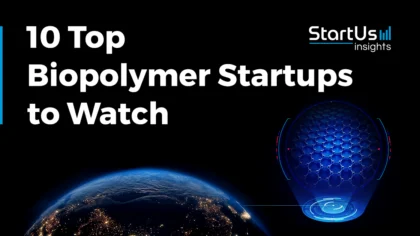Accelerate Productivity in 2025
Reignite Growth Despite the Global Slowdown
Staying ahead of the technology curve means strengthening your competitive advantage. That is why we give you data-driven innovation insights into the textile industry. This time, you get to discover 5 hand-picked startups developing plant-based textile startups.
Global Startup Heat Map: 5 Top Plant-based Textile Startups
The 5 plant-based textile startups you will explore below are chosen based on our data-driven startup scouting approach, taking into account factors such as location, founding year, and relevance of technology, among others. This analysis is based on the Big Data & Artificial Intelligence (AI)-powered StartUs Insights Discovery Platform, covering over 1.3 million startups & scaleups globally.
The Global Startup Heat Map below highlights the 5 plant-based textile startups & scaleups our Innovation Researchers curated for this report. Moreover, you get insights into regions that observe a high startup activity and the global geographic distribution of the 119 companies we analyzed for this specific topic.
Heyday – Biodegradable Hygiene Products
In today’s globalized world, there is a need to transform one of the oldest sectors of human economic development – textiles and clothing. The environmental impact of the textile industry is due to high water use and levels of carbon emissions. Emerging textile startups develop plant-based clothing and hygiene products that are sustainable for the environment.
Indian startup Heyday provides biodegradable plant-based hygiene products for women and babies. Heyday’s patented plant-based fiber is made from organic corn and bamboo pulp grown in vertical farms. The startup offers eco-friendly sanitary pads and napkins, and panty-liners for women, as well as organic diapers for babies. Further, the startup utilizes disposal covers made from cornstarch and boxes made with soy-coated paper to ensure end-to-end sustainability.
Natural Fiber Welding – Plant-based Polymers
With the number of items of clothing per person increasing globally, textile companies are seeking novel and sustainable materials. In addition to industrial textile use, companies are moving away from fossil fuel-based raw materials such as nylon. Material science startups provide sustainable alternatives for textile companies with innovative bio-based polymers and bioplastics to reduce their carbon footprint.
Natural Fiber Welding is a US-based startup aiming to shift the textile industry towards renewable and sustainable practices. The startup provides Clarus, a patented platform that utilizes green-chemistry principles and closed-loop processes to revitalize recycled fibers. Due to its precise manipulation of molecular bonding, the startup is able to offer Mirum, a highly-customizable material made with plant- and mineral-based polymers. Mirum mimics leather and is also tunable to go beyond what is possible with leather. Further, the startup’s material is plastic-free, biodegradable, and easily recyclable.
Bast Fibre Tech – Bast Fibers
Apart from clothing, manufacturers of non-woven textiles also seek alternative raw material that is sustainable and less polluting. Nonwovens usually end up in landfills since consumers typically discard them due to defects, stains, or after prolonged use. Emerging textile startups develop novel and comparable materials derived from organic sources including agricultural waste, seeds, and plants.
Bast Fibre Tech is a Canadian startup that produces 100% plant-based, intact natural fibers with the technical and performance requirements for a wide variety of nonwoven applications. The startup cultivates seeds of dicotyledon plants, containing bast fibers, such as hemp, jute, and kenaf. Bast Fibre Tech then utilizes proprietary processing techniques and natural fiber modification to provide alternatives to synthetic and semi-synthetic materials. The plant-based and fully-compostable materials are used for producing baby and personal care products, as well as household and commercial wipes.
Vegea – Grape Marc
Up-and-coming textile and materials startups are exploring the localized nature of agricultural waste to create sustainable textile products. Depending on the nature of crops grown and the agricultural residue, startups create fabrics with comparable attributes as existing materials. For example, hemp-based fibers offer strength and functionality while also remaining eco-friendly.
Italian startup Vegea utilizes residue from winemaking, grape marc, to offer yarn, textile, and bio-based polymers. The startup’s valorization process converts grape marc, as well as other biomass, into new materials for fashion, furniture, packaging, automotive, and transportation. For example, the startup’s V-Textile incorporates vegetal or recycled raw materials such as vegetable oils and natural fibers from the agroindustry. Vegea’s materials are also customizable by technical and aesthetic properties such as thickness, elasticity, weight, finish, texture, backing textile, and bio-based content. Further, Vegea’s production processes do not use any toxic solvents, heavy metals, or other hazardous substances.
4tify – Smart Organic Fabric
The increasing use of plant-based textiles provides opportunities for companies to further develop the textile to offer improved features. For instance, startups are exploring the use of coating materials for plant-derived textiles that improve the durability of end-products. Advances in material informatics, nanotechnology, and artificial intelligence (AI) further enable clothing companies to develop novel products.
The US-based startup 4tify offers AI-customized fabric technology to help clothing brands design new sustainable fabrics for their production lines. The startup offers fabrics made from bamboo, hemp, organic cotton, and soybean. 4tify’s fabric technology is capable of making fabrics that are stretchable and easier to clean & iron, as well as efficient to produce while reducing manufacturing costs. 4tify also works with its partners to recycle fabrics, cotton, polyester, and nylon.
Discover more startups
To keep you up-to-date on the latest technology and emerging solutions, we provide you with actionable innovation intelligence – quickly and exhaustively. You can download our free Industry Innovation Reports and discover new business opportunities or save your time & let us look into your areas of interest. We provide you with an exhaustive overview of new startups, scaleups & emerging technologies that matter to you.



![10 Top Startups Advancing Machine Learning for Materials Science [2025]](https://www.startus-insights.com/wp-content/uploads/2025/06/Machine-Learning-for-Materials-Science-SharedImg-StartUs-Insights-noresize-420x236.webp)
![10 Emerging AI Solutions for Material Science [2025]](https://www.startus-insights.com/wp-content/uploads/2025/06/AI-Solutions-for-Material-Science-SharedImg-StartUs-Insights-noresize-420x236.webp)



